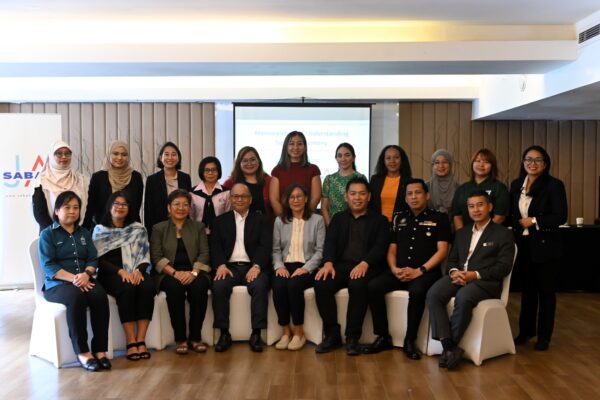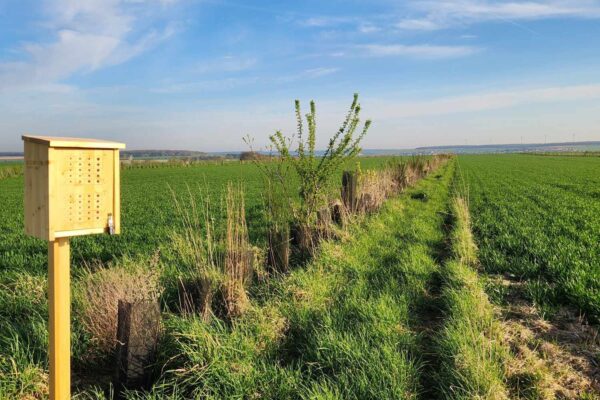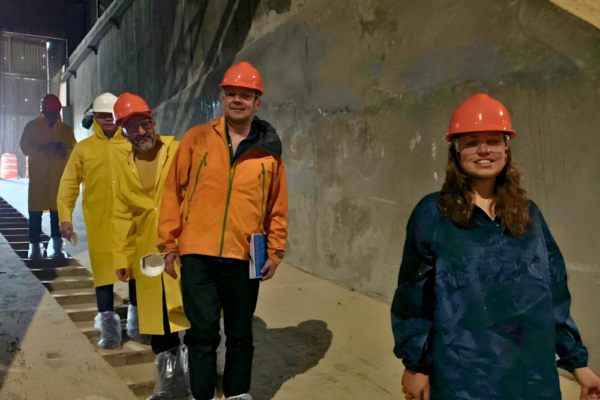PRESS RELEASE
DUBLIN, 21 March 2023: Two of Ireland's leading drinks companies are joining forces to promote regenerative agricultural practices in barley farming. Irish Distillers and HEINEKEN Ireland are coming together for a three-year collaboration to support malting barley farmers adopting regenerative agricultural practices on their farms.
This pilot project is part of a global collaboration initiated by HEINEKEN and Pernod Ricard on the resilience of agricultural raw materials. Learnings from the Irish study, including information on the environmental impact of the measures adopted, will be shared and leveraged by both companies to inform sustainability strategies for other raw materials.
Collaboration and knowledge-sharing will be key to the project's success, which involves key players in the supply chain, including a selection of 15 participating farmers from across Carlow, Kildare, Laois and Wexford and partners Earthworm Foundation and Boortmalt.
Each year, the Irish drinks industry is supported by grain production from over 2,000 farmers producing approximately 300,000 tonnes of grain from approximately 45,000 hectares. Earthworm Foundation is a leading not-for-profit organisation specialising in building value chains that work for people and nature.

The overarching aim of the initiative is to support each farm's transition towards regenerative agriculture and share this knowledge with other farmers, ultimately improving the economic and climatic resilience of malting barley farming in Ireland.
The project will seek to improve soil health and carbon retention, increase biodiversity, improve water quality and improve the livelihoods of farmers through the adoption of a series of regenerative agricultural practices, including minimising soil disturbance, increasing crop diversity, increasing soil cover by maintaining living roots all year round and reducing chemical inputs.
As part of the project, Earthworm will measure various metrics in participating farms, such as soil cover, fertilizer usage, water infiltration and profitability. A report detailing the performance of each farm against defined indicators and areas for improvement will be shared with each farmer so the impact of the new farming practices can be assessed.
An annual report will also be publicly available to track progress and share learnings and best practices. A financial incentive will be provided to farmers to support the cost of implementation and in-field experiments.

Commenting on the launch of the programme, Kathryn D'Arcy, Communications and Corporate Affairs Director at Irish Distillers, said:
“At Irish Distillers, we have a proud history of buying quality grain from Irish farmers to produce our whiskeys. In line with the Pernod Ricard 2030 Sustainability & Responsibility roadmap ‘Good Times from a Good Place’, we are committed to working in partnership with our suppliers to develop regenerative agricultural practices that enhance natural ecosystems and respond to the challenges of climate change.
Through the regenerative agriculture pilot programme for malting barley, we will support Ireland's barley farmers as they strive to reduce carbon emissions while ensuring a sustainable supply for the future production of Irish whiskey. This global programme is being piloted in Ireland and will run for three years. Along with our partners, we are keen to demonstrate the programme's potential impact and assess its potential for roll out in other countries.”
Avril Collins, Corporate Affairs Director at HEINEKEN Ireland, added:
“HEINEKEN is one of the first global brewers to have pledged net zero carbon emissions across the value chain by 2040, and working with the source of our main ingredients is key to understanding how we can reach this goal, as agriculture accounts for 33% of our global footprint. Over the past 2 years, HEINEKEN has developed a global Low Carbon Farming programme focusing on carbon reduction. Pilots in this programme in 2021 show an average 25% CO2 reduction and a 40% increase in CO2 sequestration during the farming process. We are delighted that here in Ireland, we are taking this initiative deeper to look at several parameters across soil health, water and biodiversity to understand the impact and where change can be made fully. We greatly appreciate that this journey requires many players to work together, so we are delighted to partner with our Irish Distillers peers.”
Speaking on behalf of Earthworm, Bastien Sachet, CEO of the Earthworm Foundation, said:
"We are very happy to partner with HEINEKEN and Irish Distillers on this project. At Earthworm, we believe improving soil health is key to positively impacting climate and biodiversity. Switching to regenerative practice will ensure farmers have healthier soils and can thrive economically while continuing to produce the raw materials our society needs. Through this project, the whole value chain from farmer to brand joins forces around soil health to realise a common vision. We are excited to be a part of and contribute to this collaboration"
Speaking on behalf of Boortmalt, Chief Supply Chain & Sustainability Officer Inge De Winne said:
“At Boortmalt, we are pleased to facilitate this initiative. It brings together the right partners to help support farmers improve their regenerative practices with the goal of reducing and even sequestering emissions in the soil. Having a long tradition of working very closely with farmers in Ireland, it is good to see this engagement extended to respected customers and 3rd parties. We look forward to the experience, the learnings and to sharing the findings and best practices.’’
Each year, the Irish drinks industry is supported by grain production from over 2,000 farmers producing approximately 300,000 tonnes of grain from approximately 45,000 hectares. The environmental sustainability credentials of the tillage sector are strong, with crop production producing the lowest greenhouse gas emissions per unit area of our central agricultural production systems.
What is Regenerative Agriculture?
Regenerative agriculture involves farming practices that improve soil health, biodiversity, water quality and farmers' livelihoods. The transition to regenerative agriculture starts with building healthy, living soils. When implemented successfully, practices are often tailored to each farmer and can result in highly positive environmental and economic outcomes.
Regenerative agriculture pilot programme for malting barley
Each participating farmer will dedicate one field to the experiment, dividing it into two parts of the equivalent surface. In the first part of the field, the farmer will implement conventional farming practices; in the second part, they will implement regenerative agriculture farming practices. After each year's harvest, two barley samples from each side of the field will be collected and analysed.
About Irish Distillers
Irish Distillers is Ireland’s leading supplier of spirits and wines and producer of some of the world’s most well-known and successful Irish whiskeys. Led by Jameson, our brands are driving the success of Irish whiskey globally. Jameson is the world’s fastest-growing Irish whiskey, selling 10.4 million cases in FY22. Our brands are exported to 130+ markets worldwide, with many experiencing double-or triple-digit growth.
Irish Distillers was formed in 1966 when a merger occurred between John Power & Son, John Jameson & Son and Cork Distilleries Company. In 1988 Irish Distillers joined Pernod Ricard, gaining access to unprecedented levels of investment and an extensive global distribution network. In 2022, we announced a €50 million investment in a carbon-neutral roadmap for Midleton Distillery in addition to our plans to invest €250 million in a new distillery on a site adjacent to our existing operations in Midleton
We employ over 800 people across our operations in Cork and Dublin.
About HEINEKEN Ireland
HEINEKEN Ireland, which employs 340 people at its historic brewery in Cork and across the country, produces and sells some of Ireland’s leading drinks brands. Its portfolio includes Heineken, Heineken 0.0%, Birra Moretti, Coors, Orchard Thieves, Murphy’s, Beamish, and Ireland's newest disruptor of the stout category, Islands Edge.
About Earthworm Foundation
Earthworm Foundation is an impact-driven non-profit that works on the ground to create conditions for nature and people to thrive. Partnering with businesses, civil society and governments, it focusses on implementing responsible sourcing commitments in value chains, innovating practical solutions to the social and environmental challenges of production practices, and catalysing industry-wide chain reactions to help achieve transformation at scale. Its supply chain, social and environmental experts work across 5 continents to improve conditions for people, forests, and soils impacted by cocoa production, packaging, palm oil, rubber, and more. Find out more at www.earthworm.org.
About Boortmalt
BOORTMALT is the world leader malting company with a 3 million tonnes production capacity. The group is present on 5 continents with 27 malting plants. Boortmalt’s expertise is widely acknowledged by brewers and distillers who rely on the supply of top-quality barley malt.
Boortmalt has committed to the Science-Based Targets initiative (SBTi) to stay below 1.5°c. Sustainable agriculture is one of the 4 core objectives, with Energy use efficiency, Emissions reduction, water conservation, and health & safety.
Our local sourcing programs contain and promote continuous improvement of farming practices and methodologies which enhance financial profitability and are environmentally sound and beneficial to the local communities. With all our partners, we aim to increase soil health, grain quality and climate resilience across the supply chain, from grain to glass.


